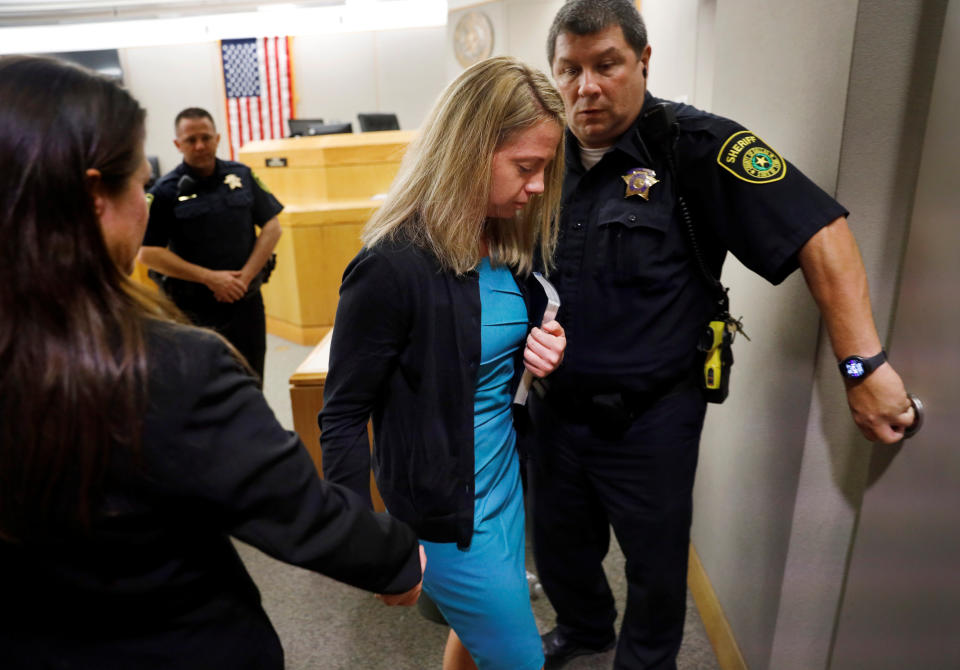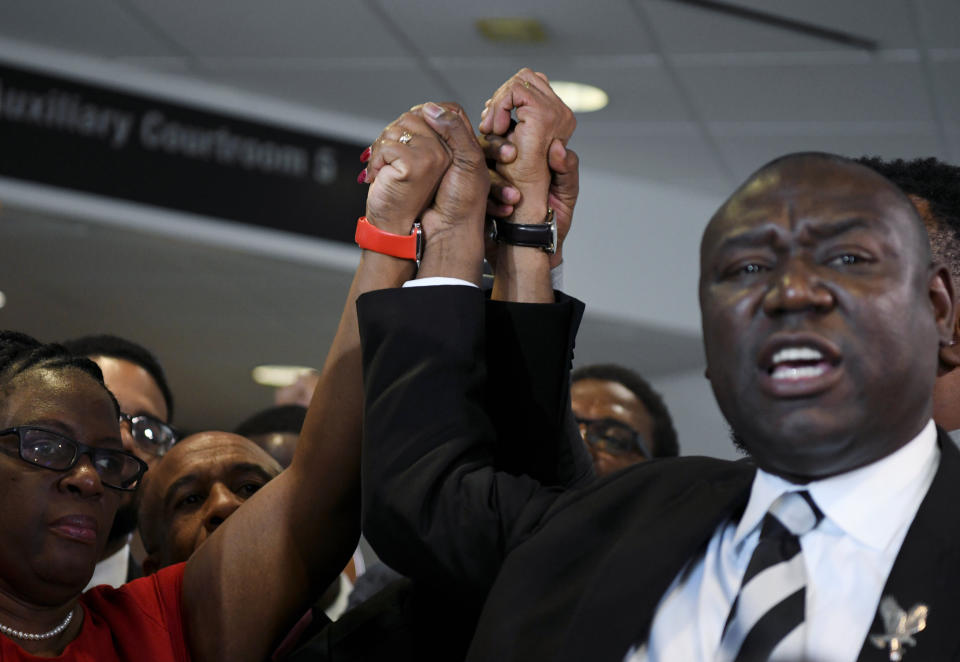Does Amber Guyger's Murder Conviction Signal A Change In Police Accountability?

Former Dallas police officer Amber Guyger’s guilty verdict and swift sentencing in the killing of an unarmed Black man was met with surprise from pundits all over the country. Some didn’t expect Guyger to face any repercussions at all.
“I, for one, was not expecting a white police officer to be convicted on the more serious charge for killing a black man, however bizarre the circumstances,” wrote CNN’s Jill Filipovic after Guyger was found guilty of murder on Tuesday.
Guyger was sentenced to 10 years in prison.
Hers is actually the latest in a string of high-profile cases in which a white officer who killed a Black person was found guilty. In 2018, former Texas officer Roy D. Oliver II was found guilty of murdering 15-year-old Jordan Edwards; Chicago police officer Jason Van Dyke pleaded guilty to killing 17-year-old Laquan McDonald in 2014; earlier this year, a Florida jury convicted officer Nouman Raja for killing 31-year-old Corey Jones.
But experts say the peculiarities of Guyger’s case make it difficult to determine whether her conviction for murder is a sign of greater police accountability going forward, or a mere aberration.

Data compiled by FiveThirtyEight shows that allegations of police misconduct rarely result in charges for the officers involved, making the jury’s finding on Tuesday ― in which an officer accused of wrongdoing was not only charged but actually convicted ― seem to some like a welcome departure from the norm. But for several reasons, Guyger’s case was hardly a typical case of officer misconduct.
Firstly, Guyger ― unlike many officers accused of misconduct ― was off-duty when she shot Botham Jean. During the trial, Guyger and her defense team claimed the officer mistakenly entered Jean’s apartment thinking it was her own and shot him out of fear. But those claims were widely panned in the immediate aftermath of the shooting, and legal experts said it was too unbelievable to withstand scrutiny in court.
“Jurors and judges are often sympathetic to officers because they think, ‘Even if they made a mistake, they were just trying to do their job,’” said Paul Butler, a Georgetown Law professor and author of the book “Chokehold: Policing Black Men.”
“But here, since the officer wasn’t on-duty, the jury or judge wouldn’t have that sympathy,” Butler told HuffPost.
Jean also wasn’t suspected of a crime, which earned Guyger a level of derision that other self-proclaimed authority figures who have killed unarmed Black people were able to avoid. To emphasize how minimal a threat Jean posed when he was killed, the prosecution even noted that he had been shot dead while eating ice cream.
“A lot of jurors would be able to put themselves in the place of Mr. Jean in a way that they wouldn’t to a person who is the more typical victim of police violence, which is a suspect in a case,” Butler said.
To that point, another reason Guyger’s trial diverged from standard cases of police misconduct is that her victim exhibited several characteristics that garnered widespread sympathy beyond the Black community. Jean was an avowed Christian, a talented singer and gainfully employed at an accounting firm.

Attorney Benjamin Crump, who represents Jean’s family, said Jean’s stellar reputation played a role in the outcome of this case.
“Botham Jean was a near-perfect person of color, so this jury had to make history in America today,” Crump told reporters after Guyger’s guilty verdict was announced. “But it shouldn’t take all that for unarmed Black and brown people to get justice,” he added.
But Butler told HuffPost that there was cause for optimism in the Guyger case, even if the specifics make it impossible to declare the conviction part of some trend of accountability.
Namely, he said the diverse jury in Guyger’s case, which reportedly included 10 nonwhite jurors out of the 12, may have played a role in the conviction. In courthouses across the country, the jury selection process has been seen as a method to weed out Black and brown potential jurors whose understanding of race ― and whose interpretation of the law ― may differ greatly from their white counterparts’.
Butler said many jurisdictions, including Dallas County, where Guyger was convicted, have taken steps that effectively diversify the jury pool by including people who have a driver’s license or state ID, rather than merely selecting from the voter registration rolls as is typical.
“When jurisdictions expand the jury pool to actually reflect the community, that results in more diverse juries,” he said.
Broadly speaking, various social justice movements have brought more attention to cases in which police officers have shot unarmed Black people. Accepting as a caveat that Guyger wasn’t on-duty when she killed Jean, her case existed in an environment that has seen social justice advocates pressure the legal system to mete out justice without regard for whether the offender is an officer or not.
In 2014, St. Louis County prosecutor Robert McCulloch was widely criticized for failing to convince a grand jury to indict former St. Louis police officer Darren Wilson, who shot and killed an unarmed teenager named Michael Brown in the city of Ferguson. That scrutiny lingers to this day, Butler said, arguing this pressure may have played a role in charges being brought against Guyger in the first place.
While prosecutors ― many of whom are elected officials ― may be reluctant to bring charges against officers accused of wrongdoing for political purposes, they are at least aware of a constituency that will hold them accountable if charges aren’t brought.
“In jurisdictions that have large minority populations, prosecutors are starting to understand that their constituents want police officers who commit crimes to be prosecuted like anyone else who’s committed a crime,” Butler said.
“So there’s more incentive for prosecutors to bring these cases.”
Related Coverage
Attorney: Botham Jean Got Justice Because He Was ‘A Near-Perfect Person Of Color’
Amber Guyger Sentenced To 10 Years For Murder Of Botham Jean
Secular Groups Claim Judge Crossed A Line By Giving Amber Guyger Her Bible
Love HuffPost? Become a founding member of HuffPost Plus today.
This article originally appeared on HuffPost.

